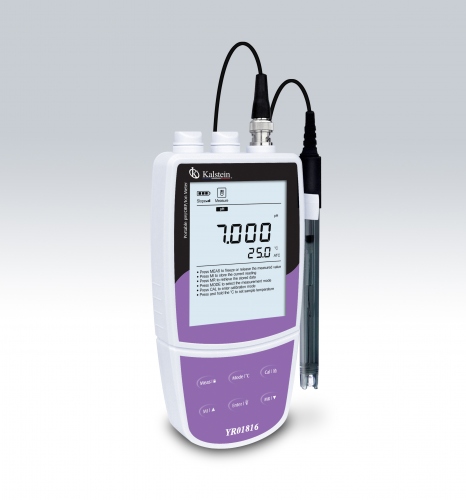An ion meter is an analytical and electrochemical instrument used to measure the concentration of ions in a solution, using ion electrodes (ISE).
A selective ion electrode is a kind of sensor that allows to test ions in various types of samples, whether environmental, pharmaceutical, biotechnological, food, agricultural, industrial, drinking water, wastewater among others. The most commonly tested ions include ammonia, nitrate, chloride, fluoride, calcium, sodium, potassium, silver, iodide, sulfide, lead, bromine, cadmium, copper and others.
What is an ion?
An ion is an atom or group of electrically charged atoms. This molecule may have a positive or negative charge. A cation is an ion with a positive charge and an anion is one with a negative charge (atom or molecule). Ions are formed when a neutral (electrically neutral) atom loses or gains electrons. Anions have more electrons than protons and cations have a higher proton number.
How does an ion meter work?
As mentioned above the measurement of the ion concentration or the measurements of specific ions through an ion meter can be performed on a wide variety of samples such as: water, food, beverages, pharmaceuticals and also samples of biological origin.
An ion meter works by selective ion electrodes (ISEs) which are measuring devices with a sensitive membrane capable of measuring ion activity. These devices measure the concentration of ion determined in a solution using a sensor electrode and a reference electrode. They work through ion exchange, where the difference in potential that is generated when the electrode comes in contact with the ion being studied is measured. The specific ion activity is transformed into electrical potential at the moment it comes into contact with the active membrane of the selective ion electrode.
Thus, the measurement process in an ion meter is carried out by the use of two electrodes: the sensor and the reference sensor. The sensor electrode is responsible for the selectivity of a specific ion. And the reference electrode is used to calculate the potential difference.
What do we offer you in Kalstein?
At Kalstein, as the MANUFACTURER of the best quality laboratory equipment, we have a wide range of ion meters, electrodes and solutions at the best PRICES on the market. Our ion meters are designed with high quality and the best technology, so they are ideal equipment for the most critical and routine tasks, our equipment are manufactured to help you face the greatest challenges in analyzing samples with different applications, and that allow you to address your different measurement needs.
This time we present you the professional portable potassium ion meter YR01817-13, suitable for outdoor applications, precision: 1% F.S. This innovative device has the following features:
- Equipped with a backlit LCD screen.
- Calibration from 2 to 5 points of low to high concentrations.
- Selectable concentration calibration points of 8, including 0.001 to 10000
- Selectable concentration units – PPM, MG/L and MOL/L.
- Automatic electrode diagnosis shows calibration points and slopes.
- Automatic temperature compensation ensures accurate readings across the range.
- Direct ion concentration reading simplifies the measurement process.
- Auto-read function The measurement end point is detected and locked.
- Calibration Due Alarm Applicants require the user to regularly calibrate the meter.
- Set-up menu allows you to set the number of calibration points, stability criteria, temperature, unit, date and time.
- The reset function automatically resumes all settings to factory defaults.
- Expanded memory stores or remember up to 500 data sets
- USB communication interface for data transfer or by connecting a power adapter to the meter.
For more information visit us on our website, in the products section: HERE

